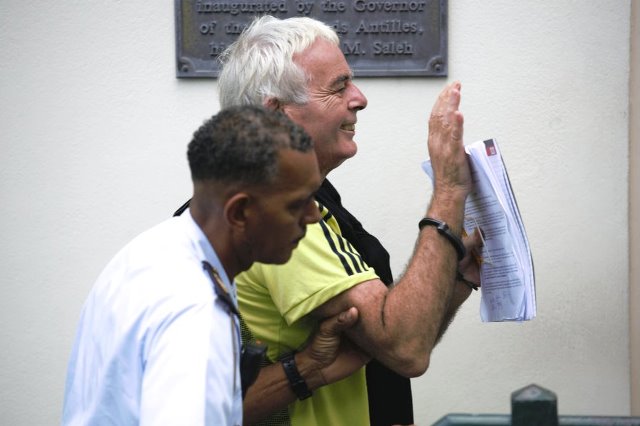Source Today Newspaper
GREAT BAY – To the dismay of his attorneys, the Common Court of Justice refused last Friday for the fourth time to suspend the extradition detention of casino owner Francesco Corallo.
Corallo;s attorneys Eldon ‘Peppi’ Sulvaran and Claudia Reijntjes-Weerdenburg had argued to the court that Corallo’s detention n violates the European human rights treaty. They cited the deplorable circumstances of their client’s detention in a cell at the police station in Philipsburg, the length of his extradition-detention and the lack of justification for further detention.
Later they added another argument: the other suspects in the case that were detained in Italy have all been released; Corallo’s accountant Rudolf Baetsen, BetPlus manager Alessandro La Monica and attorney Arturo Vespignani. The court in Rome ruled that extradition-detention abroad has to be included to determine the maximum term of detention of 6 months.
Like Corallo, Baetsen was arrested on December 13; he arrived on January 5 in Italy, but his 6-month term ended on June 12. This means that the Italian authorities included the time Baetsen spent behind bars in St. Maarten (on the French side) in the 6-month term.
“This means that by now the maximum term for Corallo has been exceeded and that he cannot be taken into custody in Italy anymore,’ the attorneys reasoned.
The court notes in its ruling that the presumption of innocence applies to the case, but it also noted that Corallo’s extradition has been requested to prosecute him for participation in a criminal organizations, embezzlement and money laundering.
That statement about money laundering in the ruling is remarkable, because the extradition papers state clearly that Corallo cannot be accused of money laundering.
The court maintained that serious flight risk is the only consideration in cases of extradition-detention. The court states that it is plausible that Corallo is “a very wealthy man” who has made many travels in the past. In this context, the court ruling refers to a decision from the Italian judge of instruction of June 14 that describes the movements of Corallo and Baetsen: “The programmed trips to different locations in the world suggest a route that cannot be called touristic but instead business-oriented, because it concerns areas that have a reputation for money laundering and the evasion of fiscal obligations.” The decision then mentions Dubai, Panama City and the Netherlands Antilles as destinations.
“This flexibility to go wherever he wants is an indication of flight risk,” the Common Court ruling states. The court considers in particular the close ties Corallo “apparently” maintains with the Dominican Republic. “He is allegedly a resident of that country and allegedly has an identity card.” Extradition from the Dominican Republic to Italy is not possible.
The court acknowledges that Corallo has the Dutch nationality, that he does not have a criminal record, that St. Maarten is his place of residence and that he has significant business-interests on the island. Furthermore, the court notes that Corallo was already in 2014 aware of the interest of the Italian judiciary in his person and that he nevertheless opted to remain in St. Maarten.
The court says in its ruling that Corallo’s detention at the police station is justified because he cannot be held at the Pointe Blanche prison for security reasons. That’s because of the fact that he is wealthy, the court notes.
In spite of the critical remarks from the defense about the circumstances of Corallo’s detention at the police station, the court ruled that the detention is not unlawful.
The court furthermore ignored the fact that Baetsen, La Monica and Vespignani have been released in Italy: “That concerns those people and not the person whose extradition has been requested.”
The Italian attorney Giannone explained in an opinion about the maximum term of custody: “Corallo, if extradited to Italy, will be released immediately for expiry of the maximum stage terms.” But the court says in its ruling that the Italian authorities have not indicated this. “It is not up to the extradition-judge to get ahead of decisions about the temporary custody. That is up to the judge in Italy.”
The court concluded that is sees no reason to suspend the detention against the payment of bail and other conditions. It is not possible to appeal the decision.





























